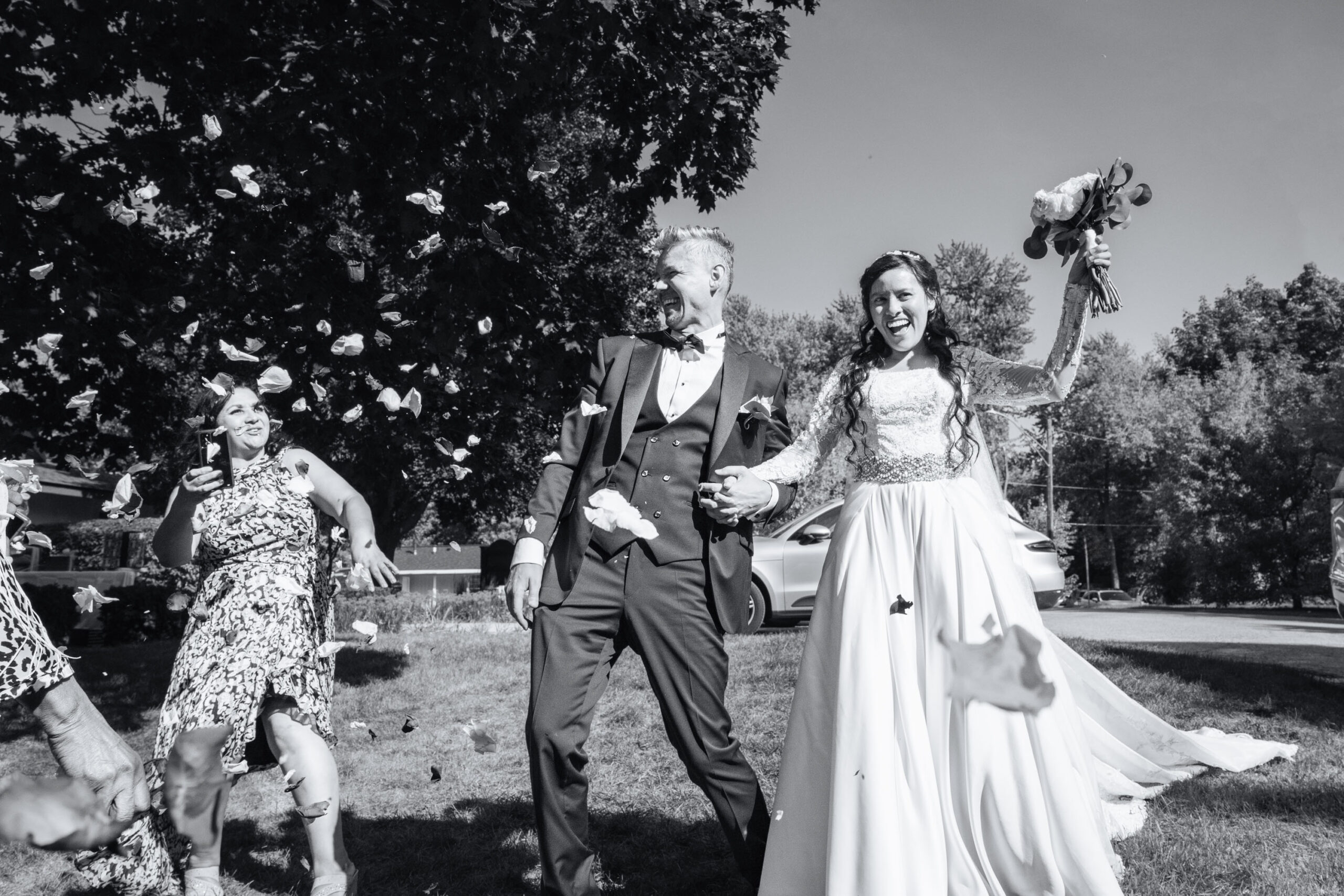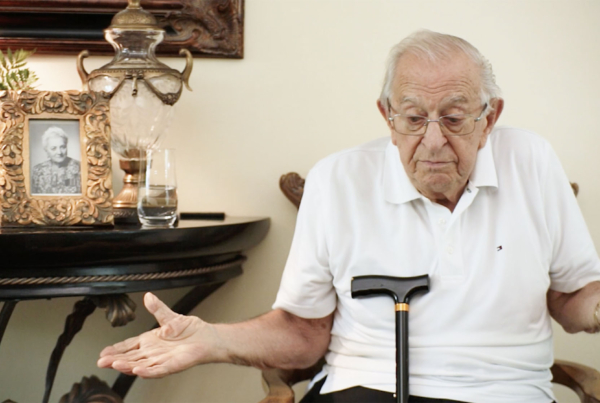Transkrypcja (english below):
Przyjeżdżamy do tej kopalni. Panie, które pracowały tam, u gospodarzy, momentalnie zorientowały [się], rzucają różne rzeczy na nas to. Konwojenci, zwykli żołnierze, nie zwracają na to żadnej uwagi, listy nawet rzucają. Jeden dostałem i mi przeczytali, że podpisała się Ania czy Hania. Ale powiedziała mnie: „Współczujemy wam, warszawiakom. Jesteśmy dumni z was. Jeśli możemy wam pomóc, żebyśmy to nawet musieli zrobić na plecach, w każdym wypadku zgadzamy się.”
A czy tam, w takim obozie, były też kobiety?
W którym?
Tym koło Norymbergi? (0:50)
Nie, nie. To [była] okolica, przez którą prowadzili nas do kopalni. Oparkanione potem wszystko. W kopalni było 10 francuskich górników. Nas przyjechało 77 i w ciągu pierwszego tygodnia produkcja spadła [o] 90 proc. Gdzie, chłopaka z Warszawy, zawieźć do kopalni?? Jak oni to kombinowali, nie mam [pojęcia]. Poza tym to nie była kopalnia, to był brudny węglowy żwir, ale setki niemieckich furmanek stało, żeby je ładować.
I co, ładowaliście?
Ładowaliśmy.
A czy ktoś was tam pilnował?
Na dole? Nie, bo tylko jeden szyb był. Wszystko inne żołnierze to…? (2:03). I oczywiście tam się cuda działy. Przede wszystkim tak strasznie coś śmierdziało, jak żeśmy weszli. Poprowadzili nas do jadalni, te prycze, pokoje były w drugim miejscu. No, myślę sobie, tutaj zginiemy, tu na pewno gaz jest. Wszyscy się domyślali, nikt nie zgadnął. Potem Niemiec wytłumaczył, dogadaliśmy się. Ja miałem koło siebie Brylka, który bardzo ładnie mówił po niemiecku, ze względu na to, że miał sąsiada, chłopca i dziewczynkę, i ci mówili, oczywiście tak razem się zmieszali.
I co tak śmierdziało?
Dogadaliśmy się: to była zupa chrzanowa. Podobno bardzo dobra na płuca górników.
Aha, czyli oni dla was robili tę zupę.
Teraz wszyscy głodni.
A dobra była, czy nie? Jak człowiek głodny, to zje wszystko.
Trudno nazwać. Jest nas 77, zamyka Niemiec kucharz okienko, a tutaj jeszcze 25 chłopaków stoi z menażkami. Zupy już nie ma. No to zjadali, wymyli tę [menażkę], wycierali i stanęli w kolejce i tego… No to wprowadzili metalowe sztony. Niemiec rozdawał te metalowe sztony i trzeba było [je] wrzucić do takiej puszki. Wszyscy przechodzą, chce zamykać okno, a tu 20 chłopa stoi. Ten słuchał, tylko że oni nie wrzucali, tylko że ten, co chciał drugi raz, to tylko stuknął o puszkę i stał w kolejce znów. Niesamowite historie były.
I do którego roku byłeś tam? To był taki stalag?
Nie, nie. To była osobna kopalnia węgla. Ogrodzona oczywiście, nasz ten teren i pilnowany przez wojsko, takich starszych panów przeważnie i to wszystko (otóż to).
A do którego roku tam byłeś?
Ja tam byłem tylko parę miesięcy i to było… A mam jeszcze tutaj… Najpierw byłem vertrausmannem, a w wielkim obozie był wielki vertrausmann, który rządził tymi, pomagał Niemcom nas zorganizować itd. Ja do niego napisałem list i on mi odpisał, że zobaczy, dlatego że zaczynali się brać do bicia, do nas. On nie umiał tym wózkiem, te wózki się wykolejały. Jeden z tych górników był postrzelony na Krymie i był (nie)zrównoważony psychicznie, dlatego od czasu do czasu był półprzytomny i od czasu do czasu musiał iść do domu. Ale wszyscy tam potrzebni chociaż na godzinę. Więc on mnie uczył, jak strzelać ten dynamit. Malutkie takie kulki były.
Rozwalać te skały węglowe?
No nauczył mnie co było tego. Ja pilnowałem się, jakby nie było. Ja kiedyś rozsadzałem w Warszawie kasę ogniotrwałą – nie powiem, nie wyszło za dobrze – więc, ale tak myślę sobie… Ale jak on nie przyszedł do pracy i ja miałem sam to robić, to drylowałem (wierciłem) te wymiary, co on miał napisane, ja tych samych używałem. Niech mnie ktoś inny nie mówi, dlatego że na te miejsce przyszykowani byli, żeby strzelać tutaj, tylko on nie przyszedł. Popychają więc mnie, żebym ja. Dla świętego spokoju ja chłopcom powiedziałem, że ja strzelam, żeby się przygotowali, że jeśli coś nie będzie tak, żeby tego… W każdym razie za pół godziny mieliśmy wody pod kolana. Jakieś jeziorko tam było czy coś.
Puściło.
Oczywiście wszyscy drabinami do następnego pokładu, no i windą uciekali. Cała awantura, draka, dobrze, że za dużo nie było. I przyjechał ten… Za to zaczynali nas poganiać, a to tu, a to tamto. No i on przyszedł, i on nas zabrał. Zabrał nas do przepięknej szkoły, oficerskiej i podoficerskiej, wszystkich obsłużaczy (obsługujących) co było do przeciwko samolotom (przeciwlotniczej). Bardzo ładnie to położone. I my, nikt nas nie kąpie, i my niemal zaczynamy dostawać wszy.
Tam nie było żadnych pryszniców po tej pracy?
Ich nie umyją, a one się rozmnażają. Ich trzeba szukać. W każdym razie doszło do tego, że jak przywieźli nas do tego obozu, to ja idę w tym obozie był jeden pokoik, 150 chłopców było w baraku, jeden pokój był niemiecki, który miał drzwi od zewnątrz i od wewnątrz. I on tam spał w nocy i to on prowadził ten cały [barak]. I my jemu mówimy o tym, więc on nie ma. Ja rozumiem, że transporty, ja rozumiem wszystko, jak utrzymać tyle milionów ludzi, nakarmić, dać i wojsko swoje… Niesamowita organizacja była. Więc ja z tej paczki, co jeszcze miałem papierosy, to ja powiedziałem, że skupuję wszy.
Wszy?
Tak. Ale żeby były wypasione, przyzwoite wszy. I daję tam cenę za to. O, nie chcieli się zgodzić, w każdym razie dostawałem dwie wszy za ćwierć papierosa. Miałem takie pudełeczko, zebraliśmy i tam dosyć dobrze ich naskładałem. I teraz biorę Brylka, biorę Zadziorę, ja, idziemy do niego. On siedział przy biurku, pukamy. Ja stanąłem, Brylek go zasłonił, ja zasłaniałem Brylka… Nie, nie Zadziora był, tylko ten, Partyzant, zasłaniał jego. I tu jego łóżko stało, więc on podniósł mu koc…
I wrzucił mu te wszy?
Wszystko. Myśmy dogadali się z tym, bla-bla-bla-bla, tego. Następnego ranka, jak idziemy na apel do pracy, to on liczy nas, ale tak robi jak my. Na drugi dzień ma witkę, taką witkę, patyczek i tak się skrobie. Zdaje się na czwarty dzień ciężarówa przyjechała.
I wzięła?
Ogromna taka. Ale nie do Ravensbrück, tylko podobne to imię (nazwa), musiałbym mapę znaleźć. Tam nas zabrali, zrobili odwszenie piękne, ukradli mi popelinową koszulę i ukradli mi…
Oj, tę chustkę… I stąd już poszło, że za każdym razem, jak masz garnitur, to za każdym razem widzę innego koloru groszki.
Bardzo mi pomogła, bardzo mi pomogła ta chusteczka. Tak prana, opiekowałem się nią, tak jak za brudne coś było, to nie dotykałem nią, tylko wolałem tak rozetrzeć…
Szkoda, że ją straciłeś.
Transcription:
So we arrive at this mine. The ladies who worked there immediately caught wind of what was going on started throwing different things at us. The escorts, just regular soldiers, didn’t mind that at all, they even threw letters. I got one, and they read it to me, some Ania or Hania signed it. She said: “We feel sympathy for you, the people of Warsaw. We are proud of you. If there is any way we can help, even if it was on our backs, we will.”
Were there any women at the camp?
Which one?
The one near Nurnberg? (0:50)
No, no. This was the area through which they lead us to the mine. Everything else was fenced off. At the mine, there were 10 French miners. They brought 77 of us and in the first week production fell by 90 percent. Who takes a boy from Warsaw to a mine? I have no idea what were they thinking. Besides. This was no coal mine. It was dirty coal chippings, but hundreds of German wagons awaited for it to be loaded.
And, did you load them up?
Yes, we did.
Was anyone watching you?
Down below? No, because there was only one mineshaft. All the other soldiers…? (2:03). Of course, all sorts of curious things happened there. First of all, it stank so bad when we walked in. They took us to the dining hall, those bunk beds, rooms were in another place. So I’m thinking, this is where we die, there is surely gas in here. Everyone guessed that. I had Brylek next to me, who spoke good German because he had a neighbor, a boy, and a girl and they spoke and they mingled.
So what stunk so bad?
We realized that it was a horseradish soup. They say it is good for miners’ lungs.
Right, so they made this soup for you.
Everyone was hungry now.
Was it good or not? When you’re hungry you’ll eat anything.
It’s difficult to say. There are 77 of us. The German cook shuts the window, but there is still 25 guys with empty bowls. No more soup. So they would eat, wash the bowl, wipe it and stand in line and that… So they gave us metal tokens. The German passed around those metal tokens and you had to put them in a can. Everyone walks by, he wants to shut the window, and there’s still 20 men there standing. He listened, but they didn’t put it in the can, if they wanted more soup, they just knocked on the can and got back in line. There were some incredible stories.
So until which year were you there? This was a kind of a stalag?
No, no. This was a separate coal mine. Fenced off, of course, the area where we were was surrounded by soldiers, older guys, usually.
So until what year were you there?
I was there only for a few months and that was… and I also have here… first I was a vertrausmann, and at the great camp there was this great vertrausmann, who managed those, helped the Germans to organize us, etc. And I wrote a letter to him, and he wrote back that he will see into it because they started to beat us. He couldn’t use that cart, they would tip over those carts. One of the miners was shot in Crimea and he wasn’t mentally stable, so every now and then he was half-conscious, and sometimes he had to go home. And they were all needed there, at least for an hour. So he taught me how to use dynamite. Small pellets like that.
To break coal rocks?
So he taught me that. I was careful. I once blew up a safe box in Warsaw – I won’t lie, it didn’t go well – so I’m thinking… if he didn’t come to work, and I was to do it myself, so I drilled those dimensions he had written down and used those same ones. So nobody can tell me that because they knew this place they were ready to blow here but he just didn’t come. They pushed me to do it. So I told everyone I would do it, so they could prepare and if anything goes wrong, so the could… Anyway, half an hour later we were flooded knee-deep. There was a lake in there or something.
It let go.
Naturally, everyone ran up the ladders and elevators. All this fuss, luckily, there wasn’t very much. That one guy came… and they started to haste us, this here, that there. And he came and took us. He took us to a beautiful school, a military academy, where they taught those guys who worked the anti-aircraft guns. It was beautifully set. And us, nobody let us was, we started getting lice.
There were no showers?
If you don’t wash them they spread and you have to find them. Anyway, when they brought us to that camp, I go there, and there was one room there, with 150 boys in the bunkhouse, one room was German with doors to the outside and to the inside. And he slept there at night and he was the one who managed this whole [bunkhouse]. And we told him that, but he didn’t have lice. I understand that the transports, and how to maintain millions of people, feed, them, and the army and all… the organization was tremendous. So I took out the cigarettes that I still had and I said that I will buy lice.
Lice?
Yes. Big, fat, decent lice. And I gave them a price. But they wouldn’t go for it, anyway, I got two lice per quarter of a cigarette. I had this box and we gathered quite a few. And so I took Brylek, I took Zadziora, and we go. He was sitting by the desk. I stood there, Brylek covered him, and I covered Brylek… No, wait, Zadziora was, that guerilla, he covered him. His bed was right there, so he picked up the blanket…
And they put lice in there?
All of it. We talked some blah, blah, blah and that. The next morning, as we went for the assembly to go to work, he counts us, but he does just like us. The second day he had a stick to scratch himself. On the fourth day, the truck came.
And took you away?
A big truck. But not to Ravensbruck, but some other similar name, I would have to look at a map. That’s where they took us deloused us, and they took my shirt, and they took…
Oh, that scarf… and ever since then when you ear a suit, you have those spotted handkerchiefs.
It helped me very, very much that scarf. I washed it, kept it if something was too dirty I wouldn’t touch it with it.
It’s a shame you lost it.










